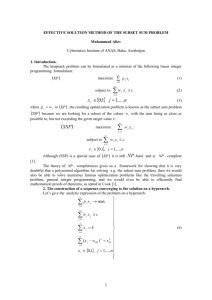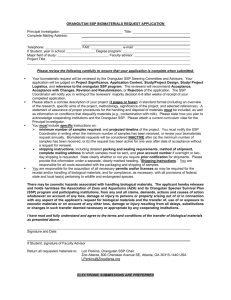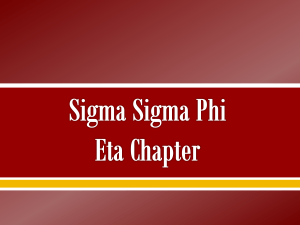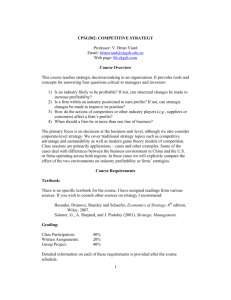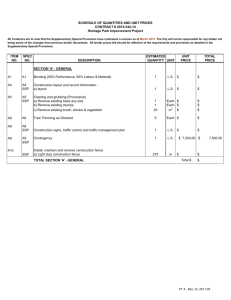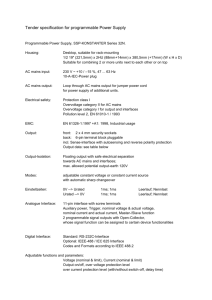Course Selection and Academic Advice
advertisement
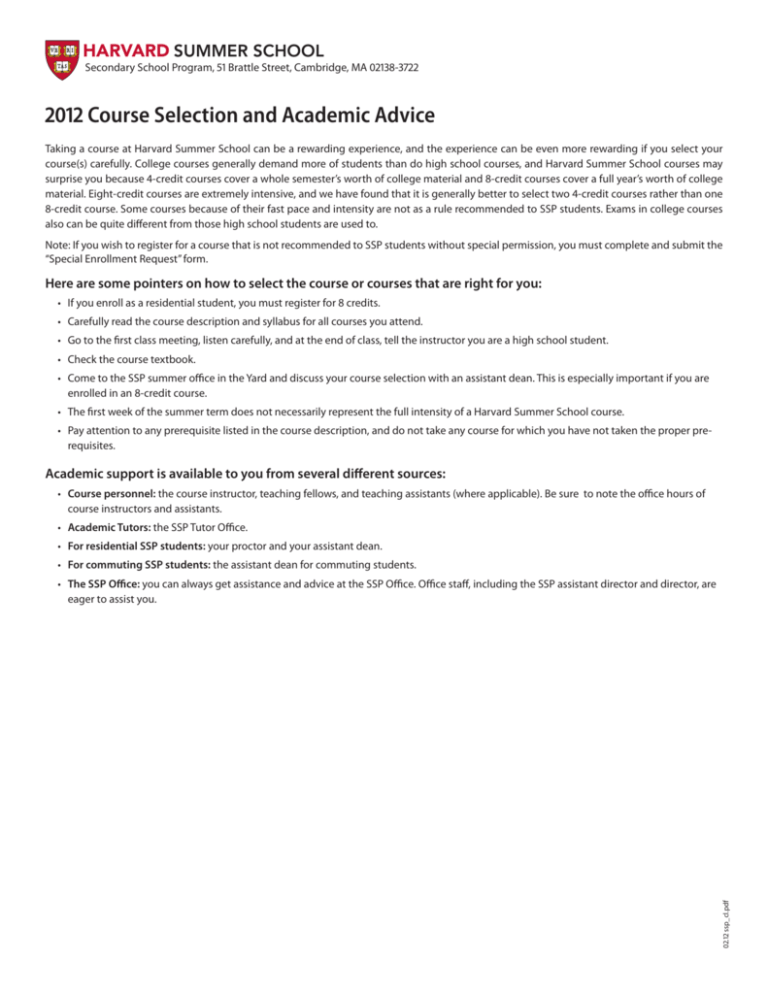
HARVARD SUMMER SCHOOL Secondary School Program, Brattle Street, Cambridge, MA - Course Selection and Academic Advice Taking a course at Harvard Summer School can be a rewarding experience, and the experience can be even more rewarding if you select your course(s) carefully. College courses generally demand more of students than do high school courses, and Harvard Summer School courses may surprise you because -credit courses cover a whole semester’s worth of college material and -credit courses cover a full year’s worth of college material. Eight-credit courses are extremely intensive, and we have found that it is generally better to select two -credit courses rather than one -credit course. Some courses because of their fast pace and intensity are not as a rule recommended to SSP students. Exams in college courses also can be quite different from those high school students are used to. Note: If you wish to register for a course that is not recommended to SSP students without special permission, you must complete and submit the “Special Enrollment Request” form. Here are some pointers on how to select the course or courses that are right for you: • If you enroll as a residential student, you must register for credits. • Carefully read the course description and syllabus for all courses you attend. • Go to the first class meeting, listen carefully, and at the end of class, tell the instructor you are a high school student. • Check the course textbook. • Come to the SSP summer office in the Yard and discuss your course selection with an assistant dean. This is especially important if you are enrolled in an -credit course. • The first week of the summer term does not necessarily represent the full intensity of a Harvard Summer School course. • Pay attention to any prerequisite listed in the course description, and do not take any course for which you have not taken the proper prerequisites. Academic support is available to you from several different sources: • Course personnel: the course instructor, teaching fellows, and teaching assistants (where applicable). Be sure to note the office hours of course instructors and assistants. • Academic Tutors: the SSP Tutor Office. • For residential SSP students: your proctor and your assistant dean. • For commuting SSP students: the assistant dean for commuting students. . ssp_cl.pdf • The SSP Office: you can always get assistance and advice at the SSP Office. Office staff, including the SSP assistant director and director, are eager to assist you. Courses & Fields for Summer 2012 With over 200 courses in 50 liberal arts fields, admitted Secondary School Program students can spend their summer exploring everything from the Harlem renaissance and modern dance techniques to marine life and microeconomics. The majority of courses carry 4 credits. There are several 8-credit courses in the languages and sciences. Some courses have prerequisites and require proficiency or placement exams. Please note this list is subject to change. Visit www.ssp.harvard.edu for the most up-to-date course list and descriptions. African and African American Studies The Harlem Renaissance Biotechnology Medical Genomics and Genetics P Anthropology and Archaeology Environmental Crises and State Collapse: Lessons from the Past P Icons: A Material History of Harvard Introduction to Social Anthropology Anthropology and Film P Constructing Childhood: An Introduction to the Anthropology of Children The Anthropology of Water Celtic Languages and Literatures Introduction to Irish Myth, Folklore, and Music Arabic Elementary Arabic P Intermediate Modern Standard Arabic P Astronomy Space Exploration and Astrobiology: Planets, Moons, Stars, and the Search for Life in the Cosmos Fundamentals of Contemporary Astronomy: Stars, Galaxies, and the Universe Biological Sciences Introductory Biology P Principles of Biochemistry P Principles and Techniques of Molecular Biology P Principles of Genetics P Neurobiology H Genome and Systems Biology P Marine Life and Ecosystems of the Sea Stem Cell and Regenerative Biology P Feast and Famine: The Microbiology of Food Chinese Elementary Modern Chinese I Elementary Modern Chinese I, II P Intermediate Modern Chinese P Classics Summer Seminar—Myth and Poetry in Greece and Rome S Computer Science Great Ideas in Computer Science with Java H Video Field Production Building Dynamic Websites H Intensive Introduction to Computer Science Using Java P Communication Protocols and Internet Architectures P KEY: P Petition required from all SSP students S Petition required from sophomores H Online option W Web conference Online only 01.12 ssp_cl.pdf Applied Mathematics Introduction to Scientific Computing P Chemistry General Chemistry P Organic Chemistry P Dramatic Arts Introduction to Acting Acting Workshop: Developing a Character Acting Workshop: Shakespeare Acting Workshop: Comedy Intermediate Acting Improvisational Acting Directing Performing Musical Theater Modern Dance Technique and Choreography Public Speaking Economics Principles of Economics P Principles of Economics: Microeconomics Principles of Economics: Macroeconomics Introduction to Managerial Finance P Introduction to Capital Markets and Investments P Microeconomic Theory P Macroeconomic Theory P Introduction to Econometrics P Money, Financial Institutions, and Markets P H International Corporate Governance P International Monetary Economics P International Trade and Commercial Policy P Organizations, Management Behavior, and Economics P Financial Accounting P Managerial Accounting P Financial Strategy and Behavioral Finance P Capital Markets and Investments P Derivatives and Risk Management: Analytics and Applications P The Global Financial Crisis P Education Financial Management of Nonprofit Organizations P Engineering Sciences Computational Real-Time Multibody Dynamics and Kinematics P Tissue Engineering for Clinical Applications English The Bible in the Humanities and the Arts Utopia and Anti-Utopia Shakespeare Paradise Lost and Popular Culture The Enlightenment Invention of the Modern Self Tragedy: Ancient to Modern Twentieth- and Twenty-first Century American Poetry Wit and Humor The Short Story Adolescent Literature Twentieth-Century Literature: Modernism and Postmodernism Detective Fictions Environmental Studies Environmental Management Global Climate Change: The Science, Social Impact, and Diplomacy of a World Environmental Crisis Fundamentals of Ecology Environmental Economics Expository Writing Writing and Literature W Writing about Science W Writing about Social and Ethical Issues W The Essay Writing about Art Advanced Essay Writing P Art of Noticing P Multimedia Communication: Introduction to Digital Storytelling French Beginning French P Intermediate French P Oral Expression: Le Français parlé S Germanic Languages and Literatures Beginning German P Government Introduction to Political Philosophy Introduction to Comparative Politics Introduction to American Government Introduction to International Relations Summer Seminar—International Law and Human Rights S KEY: P Petition required from all SSP students S Petition required from sophomores H Online option W Web conference Online only 01.12 ssp_cl.pdf Creative Writing Beginning Fiction Beginning Poetry Beginning Screenwriting Advanced Fiction: The Novel P Advanced Fiction: Short Stories P Advanced Creative Nonfiction P Advanced Screenwriting P Greek Beginning Greek P Intermediate Greek: Pagan and Christian Rhetoric in the Late Empire P Two Tragic Women: Antigone and Medea Hindi Beginning Hindi P History Summer Seminar—Rebels with a Cause: Tiananmen in History and Memory S The Middle Ages in History and Film History of the Book, From Gutenberg to E-Readers Reform, Republic, Terror, and Empire: The French Revolution: 1787-1804 New England and the American Nation The Rhetoric of Freedom in America Summer Seminar—The Holocaust in History, Literature, and Film S The American Revolution The Old South The Middle East: Rapprochement and Coexistence Perspectives on Islam: Religion, History, and Culture The Cold War From Cold War to Global Terror: World History from 1945 to the Present H History of Art and Architecture Summer Seminar—Rome and Saint Peter’s S The Architecture of Boston History of Science Summer Seminar—On the Witness Stand: Scientific Evidence in the American Judicial System S Minds and Machines: Robots, Cyborgs, and Computers in History Italian Beginning Italian P Japanese Elementary Japanese I, II P Practical Japanese Intermediate Japanese P Journalism Basic Journalism Basic Feature Writing Feature Writing P News Reporting for the Web, Print, and Other Platforms P The Global Journalist Latin Beginning Latin P Virgil: Aeneid P Linguistics The Science of Language: An Introduction Introduction to Historical Linguistics Literature Summer Seminar—Experimental Fiction S Reality, Desire, and the Epic Form: Homer, Dante, and Joyce Mathematics Precalculus Mathematics Mathematical Models and Expressions Calculus I Calculus II Calculus I and II Multivariable Calculus Linear Algebra and Differential Equations Spaces, Mappings, and Mathematical Structures: An Introduction to Proof Museum Studies Introduction to Museum Studies Music Fundamentals of Music Near Eastern Languages and Civilization The Age of Rūmı̄: Knowledge and Patronage Through Period Pieces KEY: P Petition required from all SSP students S Petition required from sophomores H Online option W Web conference Online only 01.12 ssp_cl.pdf Government, cont. Pathways to Democracy State Formation and Society in Modern Europe The Politics of Non-Governmental Organizations P Intellectual Property H The Political Economy of Russia and China Global Energy and Environmental Politics P Crime and the Constitution War Crimes, Genocide, and Justice Globalization and US National Security Rationalist Sources of International Conflict and War International Law Nuclear Weapons and International Security American Foreign Policy International Conflict and Cooperation Philosophy Introduction to Philosophy Deductive Logic Philosophy in the Public Sphere: Philosophers as Public Intellectuals Philosophy of Mind and the Brain Sciences Introduction to Biomedical Ethics Physics Principles of Physics P Portuguese Beginning Portuguese Psychology Introduction to Psychology Behaviorism and Behavior Modification Summer Seminar—The Insanity Defense S Health Psychology: Connecting Mind and Body in Illness and Wellness The Psychology of Emotional, Behavioral, and Motivational Self-Regulation Abnormal Psychology P The Aging Mind and Body Psychology of Diversity Why People Change: Psychology of Influence Law and Psychology Religion Summer Seminar—Psychology of Religion S World Religions H Religion and Animals Literature of Journey and Quest Islam: Fundamentals of Thought and Practice H Russian Beginning Russian P Sanskrit Beginning Sanskrit P Statistics Introduction to Quantitative Methods H Fundamentals of Biostatistics Studies of Women, Gender, and Sexuality Summer Seminar—Gender, Race, and Ethics in the Twenty-First Century S Women and Television South Asian Women’s Lives When the Princess Saves Herself: Gender and Retold Fairy Tales Feminist Theater Icons of Masculinity on Film Freud, Sex, and Gender Tamil Beginning Tamil P Ukrainian Beginning Ukrainian P Twentieth-Century Ukrainian Literature: Rethinking the Canon P Contemporary Ukraine: History, Geography, and Political Thought Visual and Environmental Studies Drawing Into Painting Summer Seminar—The Book as Art: Working with Letters, Ink, and Paper S Mixed Media Works on Paper Film History and Social History: American Dreams and Nightmares, 1933-1956 Nazi Cinema: Film and Propaganda Scrutinizing the American Environment: The Art, Craft, and Serendipity of Acute Observation Art and Technique of Fiction Film Directing Cinematic Vision: Scriptwriting for Production Crucial Issues in Landscape Creation and Perception Scandinavian Nordic Cinema Sociology Introduction to Sociology: Society and Culture Globalization and Global Justice South Asian Studies Social Development in Pakistan P KEY: P Petition required from all SSP students S Petition required from sophomores H Online option W Web conference Online only 01.12 ssp_cl.pdf Spanish Language and Literature Beginning Spanish P Intermediate Spanish P Oral Expression: El español hablado P
